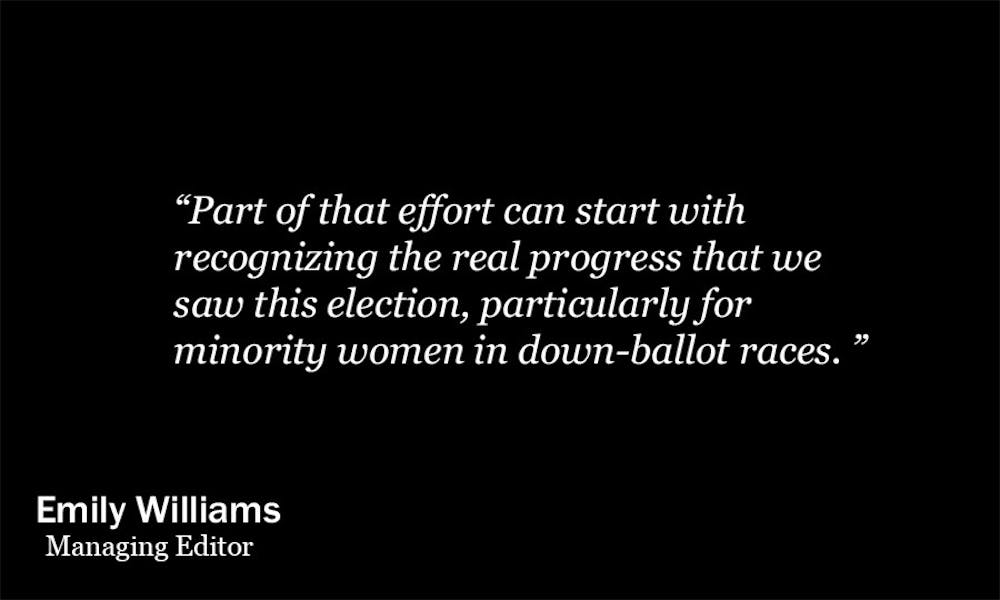On Tuesday, Hillary Clinton's supporters gathered at the Javits Center in Manhattan. The crowd convened under the building's glass ceiling in the hopes that the setting would be a symbolic backdrop for the first female president of the United States to give her acceptance speech. But that didn't happen.
Instead, after hours of waiting, watching Trump's electoral vote count climb dangerously closer to 270, campaign chairman John Podesta told them to go home.
I understand why many Americans have identified with the #NotMyPresident hashtag (which, as I'm writing right now is the top trending hashtag on Twitter), but the reality is that Donald Trump is our president-elect. And it's not just our job as participating members of our democracy to accept the vote and move on with our lives. There's more to being a participating citizen than that.
If we truly feel this strongly, if we really fear for the rights of minorities and immigrants, if we truly feel that Trump's election to the presidency is a step backward in race relations and gender equality, we need to figure out how we will advance those causes over the next four years despite our dissatisfaction with the country's selection for Commander-in-Chief.
Part of that effort can start with recognizing the real progress that we saw in this election, particularly for minority women in down-ballot races.
Until election day, Mazie Horono of Hawaii was the only woman of color in the Senate. Now, that number has quadrupled as she will be joined by Tammy Duckworth of Illinois, Kamala Harris of California who is both black and Indian American and Catherine Cortez Masto from Nevada. Duckworth is her state's first Thai American senator and the first female senator to have served in an Army combat role. Masto is America's first ever Latina senator and the daughter of a Mexican immigrant.
Ilhan Omar also made history Tuesday when she won a seat in Minnesota's House of Representatives, making her our country's first Somali-American legislator. Omar, 34, escaped the Somali civil war when she was just eight years old. After living in a Kenyan refugee camp for four years, she and her family immigrated to the United States. Now Omar, who is the director of policy for the Women Organizing Women Network, will lead a rapidly growing population of Minnesota progressives amid a divided House in St. Paul.
Pramila Jayapal, an active proponent of women's and minority rights, secured 57 percent of the vote to become the first Indian American woman to hold a seat in the House of Representatives. Jayapal has been endorsed by 20 members of Congress, including Sen. Bernie Sanders who praised her role in fighting for paid sick leave and a $15 minimum wage in Seattle.
In Oregon, Kate Brown became the first openly LGBTQ individual to be elected governor. Brown was the incumbent in the race, but Tuesday was her first time running for election. In 2012, she stepped in for former Gov. John Kitzhaber who resigned after an influence-peddling scandal. During a graduation speech at Willamette University this year, Brown opened up about how, for years, she had worried about losing her job if her sexual orientation was made public.
In her concession speech, Hillary Clinton articulately and gracefully reminded her supporters, especially young women, to stay optimistic.
"I want you to know that nothing has made me prouder than to be your champion," Clinton said. "And to all the little girls who are watching this, never doubt that you are valuable and powerful and deserving of every chance and opportunity in the world to pursue and achieve your own dreams."
Although many Americans, at least the 60 million who cast ballots for Clinton -- over 300,000 more than for Trump in the popular vote -- were fearful and heartsick at their candidate's loss, let's use these successes as proof that, regardless of who will be sitting in the Oval Office come January, our country is full of motivated, accepting and ambitious people who want to push us forward, not back.
willi501@miamioh.edu

